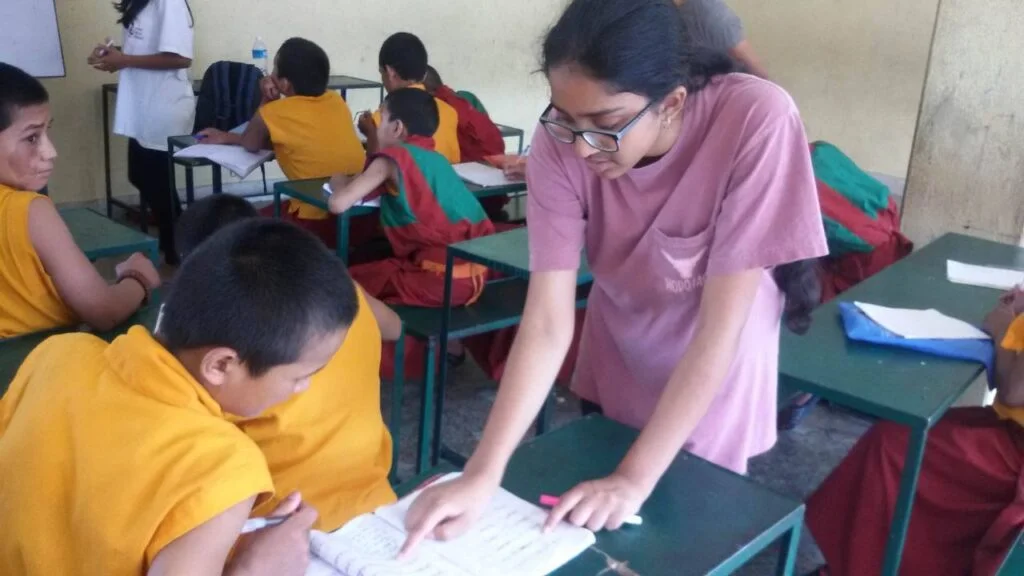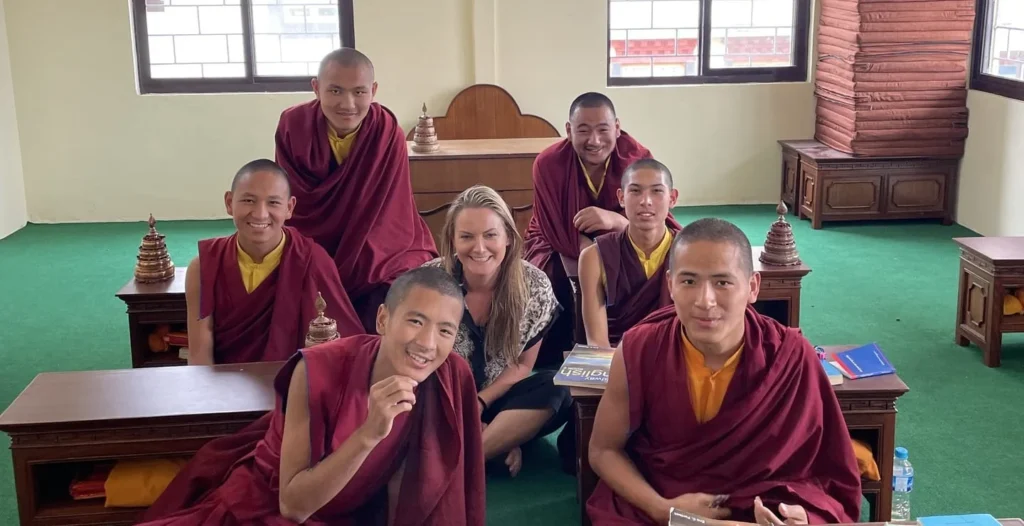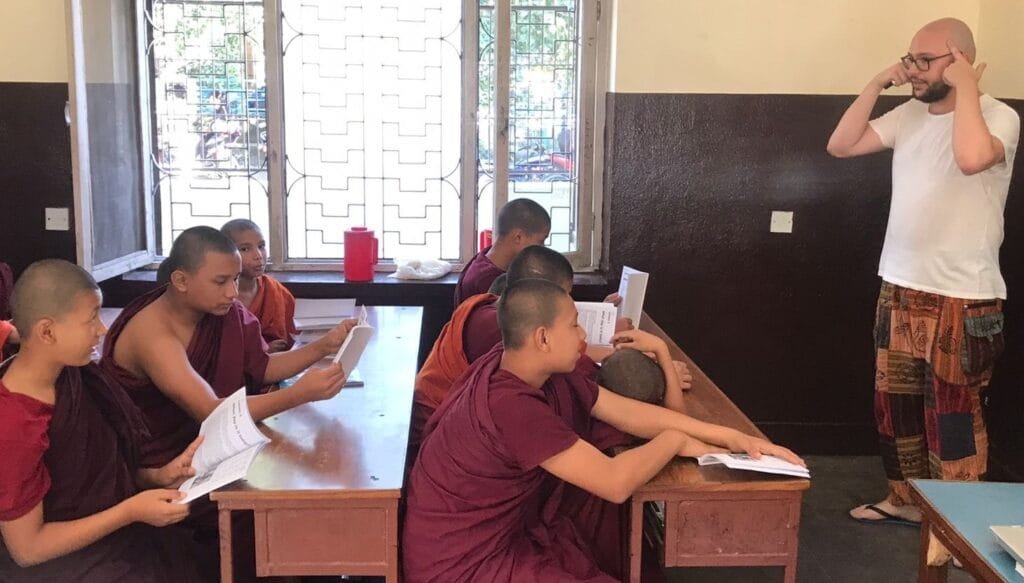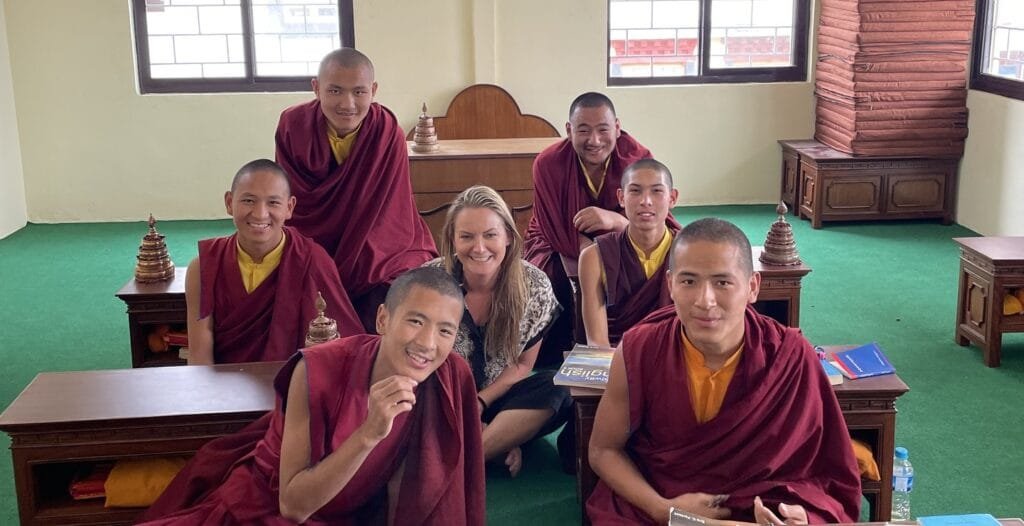Highlights:
| Icon | Roles | Description |
|---|---|---|
| 📘 | Teach English to Monks | Deliver engaging ESL lessons that empower monks to connect with global knowledge. |
| 🏫 | Volunteer Teaching in Monasteries | Lead interactive classes that foster language skills and cultural exchange. |
| 🌍 | Cultural Exchange Teaching | Facilitate sessions where volunteers and monks share cultural insights and traditions. |
| 📑 | Curriculum Development | Create tailored lesson plans as part of our Monastic Language Enlightenment Project. |
| 👥 | One-on-One Tutoring | Provide personalized tutoring to support novice monks’ language learning. |
| 📝 | Language Assessment & Feedback | Conduct regular assessments to adapt teaching methods and enhance progress. |
| 💻 | Digital Resource Creation | Develop multimedia teaching aids to enrich ESL teaching in monasteries. |
| 🤝 | Community Engagement | Organize group discussions and activities that promote practical language use. |
| 🌟 | Mentorship & Leadership | Serve as a mentor, building interfaith leadership and fostering mutual growth. |
| 📊 | Impact Reporting | Document and report outcomes to measure success and continuously improve the program. |
Welcome to our transformative volunteer project, Teach English to Buddhist Monks in Nepal. This initiative is designed for individuals passionate about education, cultural exchange, and spiritual growth. By joining our Volunteer Teaching English in Monasteries programs, you can make a difference while engaging with the rich traditions of Buddhist monastic life. Our project also opens doors for those interested in Teaching English to Monks Abroad, offering a unique blend of language instruction and cross-cultural immersion.
This comprehensive guide outlines every detail of our project—from its inception and objectives to daily activities, required skills, logistics, and success stories. You’ll learn about the benefits of volunteering as an English teacher in Buddhist monasteries, explore the program structure, and discover how your efforts can transform the lives of the monks and yourself.
Project Description
Introduction
The Monastic Language Enlightenment Project is dedicated to Teaching English to Buddhist Monks in Nepal. We aim to empower Buddhist communities by enhancing their English language skills, thus opening avenues for global dialogue, spiritual learning, and cultural exchange. This project is ideal for educators, language enthusiasts, and volunteers eager to make a difference while experiencing life in a Buddhist monastery.
Background
Nepal is renowned for its spiritual heritage and has been a center of Buddhist learning for centuries. However, many Buddhist monasteries in Nepal face challenges accessing modern education, including English language proficiency. This language barrier can limit the monks’ ability to engage with international Buddhist teachings and global communities. Our project addresses this gap by providing Volunteer Teaching English in monastery programs, empowering monks to participate actively in the worldwide exchange of ideas.
Key Objectives
- Enhance Communication: Improve English proficiency among Buddhist monks, enabling them to access a broader range of spiritual and educational resources.
- Foster Cultural Exchange: Promote mutual understanding through Cultural Exchange Teaching Programs that allow volunteers and monks to share their cultural and spiritual insights.
- Build Professional Skills: Equip volunteers with valuable teaching and intercultural communication skills in any educational setting.
- Strengthen Global Connections: Through Teaching English to Monks Abroad initiatives, bridge the gap between Eastern spiritual traditions and Western educational practices.
- Empower Buddhist Communities: Create sustainable educational programs that support long-term language development and cultural enrichment.
Why Internship for Teach English to Buddhist Monks project?
The Need
In many Buddhist monasteries across Nepal, there is a growing need for improved English language skills. Studies have shown that language proficiency enhances academic learning and promotes self-confidence and global connectivity. For example, research indicates that ESL (English as a Second Language) programs can improve cognitive function by up to 20% and increase future employment opportunities.
Global Relevance
Our project aligns with global efforts to enhance education and cultural exchange. By participating in Teaching English to Buddhist Monks, volunteers contribute to the United Nations’ Sustainable Development Goal 4 ( Quality Education ) and promote international understanding.
Local Voices
Local community members have expressed gratitude for the educational opportunities provided through our programs. One monk shared,
“Learning English has opened my eyes to new teachings and perspectives. It has allowed me to engage more deeply with global Buddhist literature and connect with visitors worldwide.”
This testimonial exemplifies the profound impact of Volunteer English Teacher for Monks initiatives on personal growth and community development.
Interns Roles and Responsibilities
10 Core Tasks for Volunteers who work in Teach English to Buddhist Monks project
- Curriculum Development:
- Collaborate with local monastic educators to create lesson plans tailored to the monks’ language levels and needs.
- Incorporate elements from Monastic English Teaching Programs and Educational Programs in Monasteries to make lessons relevant and engaging.
- Classroom Instruction:
- Deliver daily English lessons to groups of novice and advanced monks.
- Utilize interactive teaching methods such as role-playing, discussions, and multimedia presentations.
- One-on-One Tutoring:
- Provide personalized tutoring sessions for Teaching English to Novice Monks who require additional support.
- Develop tailored learning strategies based on individual progress.
- Cultural Exchange Sessions:
- Organize cultural exchange workshops where volunteers share insights about Western culture and learn about Buddhist traditions.
- Facilitate discussions that foster mutual respect and understanding.
- Language Assessment:
- Regular assessments should be conducted to monitor the progress of the monks.
- Adapt teaching methods based on feedback and assessment results.
- Resource Development:
- Create and distribute teaching materials such as worksheets, flashcards, and multimedia content.
- Ensure that resources are aligned with the goals of ESL Teaching in Monasteries.
- Community Engagement:
- Organize group activities and discussion circles that allow monks to practice English in real-life scenarios.
- Encourage participation in community events to enhance language usage.
- Feedback and Reporting:
- Maintain detailed records of student progress and teaching outcomes.
- Provide weekly reports to project coordinators, highlighting successes and areas for improvement.
- Mentorship:
- Act as a mentor and role model for both monks and fellow volunteers.
- Share personal experiences and teaching tips to foster a supportive learning environment.
- Special Projects:
- Lead unique initiatives such as organizing English movie nights, cultural festivals, and interactive language games.
- Collaborate with other volunteers to implement long-term projects that benefit the monastery.
Daily Activities: Sample Schedule
- 08:00 – 08:30: Morning Meditation and Mindfulness Session
(Begin the day with a collective meditation to set a peaceful tone.) - 08:30 – 09:15: Breakfast (Nepali standard meal provided)
- 09:15 – 09:30: Morning Briefing and Class Preparation
(Review the lesson plan and set daily teaching goals.) - 09:30 – 11:00: Classroom Instruction
(Interactive English lessons using visual aids and group activities.) - 11:00 – 11:15: Short Break
- 11:15 – 12:30: One-on-One Tutoring Sessions
(Personalized instruction for monks needing extra help.) - 12:30 – 13:30: Lunch (Traditional Nepali meal)
- 13:30 – 15:00: Cultural Exchange Workshop
(Engaging activities to share cultural insights and practice conversational English.) - 15:00 – 15:15: Afternoon Tea Break
- 15:15 – 16:30: Language Assessment and Feedback
(Conduct informal quizzes and group discussions to assess progress.) - 16:30 – 17:00: Debrief and Daily Reflection
(Volunteers and monks share their experiences and discuss what they learned.) - 17:00 Onwards: Free Time / Cultural Immersion
(Explore the monastery, participate in local traditions, or enjoy leisure activities.)
Special Projects
- Interactive Language Festivals:
Organize themed events such as “International Day,” where monks and volunteers share cultural presentations, traditional dances, and storytelling in English. - Digital Resource Development:
Develop an online repository of lesson plans, recorded sessions, and interactive exercises to support continuous learning even after the project ends. - Monastic Publication Initiative:
Assist the monastery in creating a bilingual newsletter or blog to showcase their progress and share insights with a global audience.
Skills and Requirements
Required Skills
- Passion for Education: A genuine interest in teaching and empowering others.
- Language Proficiency: Fluency in English, with an apparent ability to explain concepts effectively.
- Cultural Sensitivity: An open-minded attitude towards cultural differences and spiritual traditions.
- Adaptability: Willingness to work in a remote, monastic setting and adjust to a new environment.
Eligibility
- Open to individuals aged 18+ (younger participants may require guardian approval).
- Ideal candidates include those with a background in education, language teaching, or a strong interest in cross-cultural communication.
Preferred Skills
- Previous Teaching Experience: Prior experience in ESL or volunteer teaching roles is highly beneficial.
- Knowledge of Buddhist Culture: Familiarity with Buddhist practices and meditation is a plus, though not mandatory.
- Technical Skills: Using digital tools to create and share educational materials.
Cultural Experience
Cultural Immersion
Volunteers will have the unique opportunity to engage deeply with the local culture. As a Volunteer of Teach English to Buddhist Monks, you will teach and participate in monastic rituals, traditional festivals, and communal activities that are integral to life in a Buddhist monastery.
Language Learning
In addition to teaching English, volunteers are encouraged to learn basic Nepali phrases and Buddhist terminology. This not only enriches their experience but also helps them build stronger bonds with the monks. Our program offers optional language classes and cultural exchange sessions to enhance their understanding of local customs.
Community Engagement
The project fosters a two-way cultural exchange. Monks benefit from learning English, which opens up new opportunities for accessing global Buddhist teachings and literature. At the same time, volunteers gain firsthand insight into Nepalese monastic life’s spiritual and cultural practices.
Logistics and Support
Accommodation
Participants will reside in shared accommodations within or near the monastery. Options include traditional dormitory-style housing or homestay arrangements, ensuring an authentic living experience.
Meals
All meals are provided and feature traditional Nepali cuisine. We accommodate vegetarian diets and other dietary preferences to ensure a healthy and balanced intake throughout the program.
Transportation
We offer airport pickup services and daily transportation to and from the monastery. This includes shuttle services for off-site activities and excursions.
On-Site Support
Our dedicated project coordinators and local staff are available 24/7 to assist with any needs. Volunteers receive a comprehensive orientation that covers local protocols, safety guidelines, and cultural etiquette.
Health and Safety
We prioritize the health and safety of all participants. Volunteers are advised to have necessary vaccinations and travel insurance. The program provides emergency protocols, on-site medical support, and regular health check-ups during the project.
Program Fees.
Please visit our Program Fees page for detailed information about program fees and inclusions. Our fee structure covers accommodation, meals, transportation, on-site support, and all training materials. A €150 program booking fee is required to secure your spot, with the remaining balance payable upon arrival or via wire transfer.
Impact and Outcomes
Volunteer Impact
By participating in our Teach English to Buddhist Monks project, volunteers will:
- Develop enhanced teaching and leadership skills.
- Gain hands-on experience in cross-cultural communication and language instruction.
- Experience personal growth through immersion in a spiritually enriching environment.
- Build lasting friendships with like-minded individuals and monastic community members.
Community Impact
The impact on the local community is profound:
- Empowered Monks: Improved English proficiency allows monks to access a broader range of spiritual and educational resources, contributing to personal and community development.
- Enhanced Global Dialogue: The project promotes cultural exchange and helps bridge the gap between Eastern spiritual traditions and Western educational practices.
- Sustainable Educational Programs: The skills learned by the monks create a foundation for ongoing education and community-based language teaching initiatives.
Statistic:
Volunteers in similar programs have reported a 35% improvement in language proficiency among participants, and many monasteries have seen increased engagement with international Buddhist communities.
Success Stories and Testimonials
Volunteer Experiences
One former volunteer noted,
“Teaching English to Buddhist monks in Nepal was an eye-opening experience. The monks’ dedication and the community’s warmth made every lesson memorable. I improved my teaching skills and gained a deeper understanding of Buddhist practices.”
This experience is echoed by many who have participated in Volunteer Teaching English in Monasteries programs.
Local Impact Stories
A senior monk at the monastery shared,
“Learning English has opened a new window for us. We can now access many Buddhist teachings and connect with practitioners worldwide. This program has truly transformed our community.”
Such testimonials underscore the transformative power of Teaching English to Monks Abroad and related initiatives.
Application Process
Ready to inspire and empower? Follow these simple steps to join our Teach English to Buddhist Monks in Nepal project:
- Complete the Online Application:
Visit Apply Now and fill out the application form with your details. - Submit Your Resume:
Attach your CV and include two professional or academic references highlighting your teaching or volunteer experience. - Await Confirmation:
Look for a confirmation email with further instructions and details about your role. - Pay the Booking Fee:
Secure your spot by paying a €150 program booking fee. - Receive the Pre-Departure Pack:
You will receive comprehensive guidelines and training material before departure. - Final Payment:
Process the remaining program fee upon arrival or via wire transfer.
Frequently Asked Questions (FAQs)
Following find the Frequently Asked Questions (FAQs) for Teach English to Buddhist Monks project:
1. What is the purpose of the Teach English to Buddhist Monks project?
The project is designed to enhance the English language skills of Buddhist monks through Volunteer Teaching English in Monasteries programs. This initiative fosters cultural exchange, improves communication, and enables monks to access global educational and spiritual resources.
2. Who can apply for this volunteer project?
Our program is open to individuals aged 18 and above passionate about education, language teaching, and cultural exchange. Although previous teaching experience is preferred, it is not necessary.
3. What will my daily schedule look like?
A typical day includes morning meditation, breakfast, classroom instruction, one-on-one tutoring, cultural exchange sessions, and reflective group discussions. A detailed daily schedule is provided during orientation.
4. How do you ensure the quality of education provided to the monks?
Our curriculum is developed in collaboration with experienced educators and local monastic leaders. Regular assessments and personalized tutoring ensure that every participant receives quality instruction.
5. What kind of cultural experiences can I expect?
Volunteers can engage in monastic rituals, traditional festivals, and communal activities. Language classes and cultural workshops are also offered to deepen your understanding of Nepali traditions and Buddhist teachings.
6. What logistical support is provided during the project?
We offer shared accommodation, thrice-daily meals, airport pickup, daily transportation, on-site support from local coordinators, and comprehensive health and safety protocols.
7. How can volunteering in this project benefit my career?
This project enhances your teaching, leadership, and intercultural communication skills. It also provides valuable experience in language education and cultural exchange, which can significantly boost your resume and open doors to further opportunities in Volunteer Teaching English Abroad and related fields.
Join Us Today to Make a Difference!
Embark on a transformative journey by becoming volunteering project Teach English to Buddhist Monks. Your contribution will empower Buddhist communities, foster cultural exchange, and create lasting global connections. Whether you want to enhance your teaching skills, experience life in a Buddhist monastery, or give back through education, this project offers a unique opportunity to impact lives and broaden your horizons.
- Volunteer: Sign up for our Teach English to Buddhist Monks project and become a catalyst for positive change.
- Intern: Explore internship opportunities that allow you to work closely with monastic educators and experienced language teachers.
- Donate: Support our mission to provide quality education and cultural exchange in Buddhist monasteries.
- Share: Share this life-changing opportunity with friends, family, and colleagues who are passionate about making a global impact.
Visit our Apply Now page to secure your spot today. For further information, please email us at [email protected].
Gallery




